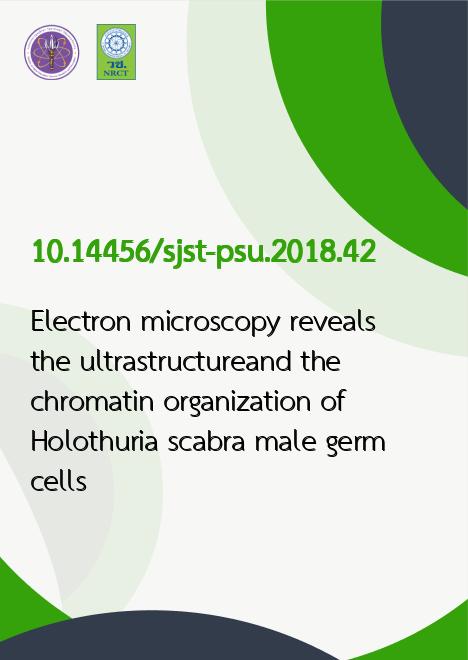
|
Electron microscopy reveals the ultrastructureand the chromatin organization of Holothuria scabra male germ cells |
|---|---|
| รหัสดีโอไอ | |
| Creator | 1. Worawit Suphamungmee 2. Nittiya Nontunha 3. Supakant Chaichotranunt 4. Yotsawan Tinikul 5. Tanate Poomtong 6. Prasert Sobhon |
| Title | Electron microscopy reveals the ultrastructureand the chromatin organization of Holothuria scabra male germ cells |
| Publisher | Research and Development Office, Prince of Songkla University |
| Publication Year | 2561 |
| Journal Title | Songklanakarin Journal of Science and Technology |
| Journal Vol. | 40 |
| Journal No. | 2 |
| Page no. | 321 |
| Keyword | sea cucumber, Holothuria scabra, reproduction, spermatogenesis, chromatin condensation |
| URL Website | http://rdo.psu.ac.th/sjstweb/index.php |
| ISSN | 0125-3395 |
| Abstract | Holothuria scabra release their gametes into seawater where external fertilization rapidly takes place. H. scabra spermare generated through the steps of germ cell proliferation and differentiation within the wall of the testicular tubule. The outermost layer of the tubular wall supports the developing germ cells. All germ cells are classified according to the heterochromatizationpattern of the cell nuclei. Based on the degrees of chromatin condensation, the two spermatid stages are classifiedas St1 and St2. The St1 exhibits a small, round nucleus with heterochromatin clumping around the nuclear envelope which, inturn, is surrounded by the mitochondrial aggregation. In the St2, thick chromatin fibers appear. Large mitochondria fuse and thetail rudiment also starts to form at the posterior, whereas acrosome and subacrosomal structures are fully formed at the anteriorregion. It is speculated that a coiling of nucleosomes organized by the sperm-specific histones causes the chromatin condensationin spermatids and sperm nuclei of H. scabra, much like what happens in sea urchin sperm which indicates a highly conservedphylogenetic process. The appearance of numerous phagosomes in the Sertoli-like cells suggests their possible roles in providingnutrients to the proliferating germ cells and phagocytic removal of cytoplasmic debris from the maturing germ cells. |
